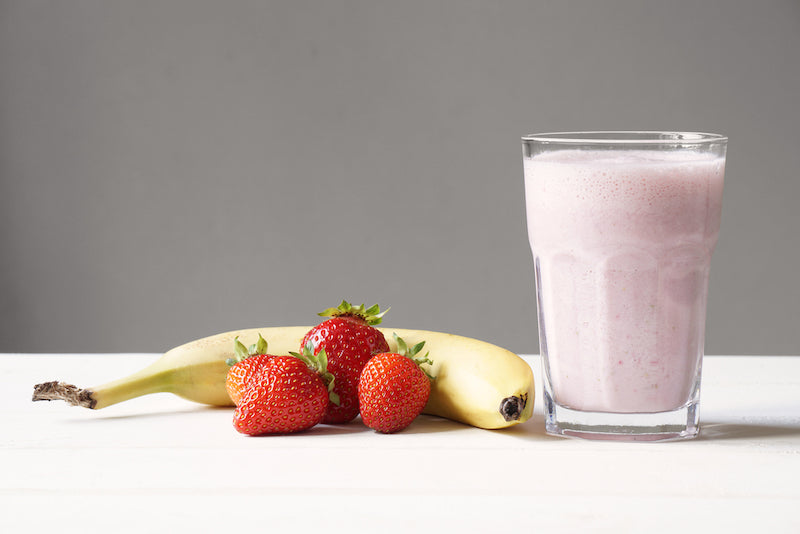Taking a whey protein supplement like whey is a convenient way to increase your daily protein intake.
However, deciding how much to take can be a little tricky.
Although protein is a key nutrient for weight loss and muscle building, taking too much or too little could actually hinder your progress.
Your activity level and your overall goals are the main factors that determine how much protein you need, and therefore how much whey protein you may need to supplement.
In this article, we'll discuss in depth how to choose a whey protein powder and determine how much you need to take each day.
How Whey Protein Benefits Weight Loss and Building Muscle
Protein is an important nutrient for not only general health, but also for changing your body composition.
In fact, protein is likely the most important nutrient if you're working to lose weight or increase weight through lean muscle mass.
When protein is digested, it's broken down into amino acids.
These “building blocks” are key players in building new muscle mass.
Protein and Branched Chain Amino Acids

A few specific amino acids called branched-chain amino acids (BCAAs) are also known to stimulate new muscle growth at the cellular level.
Every time muscle is broken down through exercise, the tissue needs amino acids to repair and build new muscle.
Whey protein is a complete protein that contains all the branched chain amino acids as well as all the other six essential amino acids.
Protein Intake and Weight Loss

Whey protein is beneficial for weight loss too.
Eating a diet high in protein helps to increase satiety between meals, boost energy expenditure, and retain muscle mass.
Increased satiety makes it easier to consume fewer calories throughout the day, while increased energy expenditure burns more calories.
The combination of these two things alone creates a larger calorie deficit to facilitate weight loss.
Types of Protein Powders

There are several types of protein powders.
Although some are more effective than others, all protein supplements will help your body build muscle to some degree.
The type of protein you choose depends on your goals, dietary restrictions, and general preference.
Whey protein is the most commonly used protein supplement. This milk protein is known as the most effective type of protein, due to its long list of amino acids.
Casein is another type of milk protein.
It's less commonly used than whey, but still carries some benefits for muscle building.
Many people prefer to take casein at night because it is digested more slowly than whey.
Therefore, they take it to help with recovery and muscle building overnight.

Collagen has recently exploded in popularity.
Although collagen is the most abundant type of protein in the human body, production tends to slow due to age and environmental factors.
Supplementing collagen may benefit the skin, joints, and muscles.
Vegetarian and vegan protein includes protein powders made from non-dairy sources like egg, brown rice, hemp, and peas.
Plant-based proteins tend to lack essential amino acids, making them slightly less effective than animal-based protein.
However, they are still beneficial for people who prefer to avoid animal protein sources.
You can easily get all nine essential amino acids from plant-proteins by eating a diet that consists a variety of plant protein sources.
How Much Whey Protein Per Day?
Before you add a whey protein supplement to your diet, it's important to determine how much protein you actually need.
This amount differs from person to person depending on your size, activity level, and goals.
The Dietary Reference Intake (DRI) for the average healthy person is 0.8 grams of protein per kilogram bodyweight.
However, people who are active and/or working to build muscle often need more whey protein (or other protein sources).
Eating protein-rich foods like lean meats, eggs, and fish may help your protein goals, but this can be difficult if your protein needs are high.
Taking a protein powder like whey protein is a convenient and simple way to pack additional protein throughout the day.
Finally, many people choose to incorporate whey protein powder into their diet because of how quickly it is absorbed.
Whey protein breaks down into amino acids that contribute to muscle growth after they are absorbed.
Again, whey protein is a popular option because it offers all of the amino acids needed to make a complete protein. Whey's convenience and rapid absorption make it an ideal supplement for recovery after a workout.
How Much Whey Protein Per Day for Weight Loss
To maximize the benefits for weight loss, you have to figure out how much whey protein you actually need to supplement your diet.
Many studies have found that eating a diet with 25 to 30 percent of calories coming from protein resulted in increased weight loss.
In fact, one study found that participants who increased their protein intake to 30 percent of their calories ate 441 calories less per day overall, and lost an average of 11 pounds more, compared to other participants over the course of 12 weeks.
For someone on a typical 2,000-calorie diet, aiming to get 30% of calories from protein would mean a goal of 150 grams per day.
This goal is difficult for many to meet through meals alone.
Therefore, using a whey protein powder could be necessary to get the protein you need.
Making a shake with two scoops of whey protein provides around 25 grams of protein.

To get the most benefit, drink your whey protein shake as soon as possible after a workout.
If you struggle to get enough protein with meals, you may need an additional shake per day to meet your needs.
Likewise, if you're highly active (four or more workouts per week), your calorie and whey protein needs will likely be even higher.
Whey Protein Dosage for Building Muscle (Scoops)
Building muscle, or bulking, requires a diet rich in high-quality protein.
If you're working to build muscle, you're probably working harder in the gym and lifting heavier weights.
More fatigue on the muscle means more muscle fibers are broken down.
Therefore, lifting weights alone isn't enough to increase muscle mass.
You need plenty of protein intake to support the process of repairing and building new muscle tissue.
Similar to weight loss, the amount of protein you need for building muscle depends on your training.
For people who train moderately (workout three times or less per week), the recommended amount of protein to build muscle is 2.2 grams per kilogram of body weight.
For a person who weighs 200 pounds, the recommended amount of protein to build muscle using this guideline is 200 grams per day.
Someone who is only moderately active may need slightly less protein (as low as 1.6 grams per kg body weight).
If you're working out three or fewer times per week, start with a lower amount of protein.
For highly active people (four or more workouts per week), achieving such a high protein goal is much easier with a whey protein supplement.
Drinking a shake made with two scoops of whey protein immediately after a workout not only provides 25 grams of protein, but the amino acids from whey protein will quickly get to the muscle to help with recovery after a workout.

Choosing Whey Protein Supplements
When it comes to protein supplements, quality is just as important as quantity.
Whey protein is generally better quality than plant-based protein because it offers all nine essential amino acids. However, not all whey protein powders are created equal.
First, choose the type of whey protein best for you.
Whey concentrate is the most common type, followed by whey isolate and hydrolysate.
Whey protein Concentrate vs Whey Protein Isolate

Overall, whey protein concentrate is considered to have the most nutritional benefit.
However, whey isolate and hydrolysate contain less lactose, making them good options for people with digestive issues.
Next, take a look at the ingredients label when you choose a whey protein.
Some brands are full of fillers, sweeteners, and other unnecessary ingredients.
To get the best quality protein powder and maximize muscle mass, avoid added sugar, sweeteners, hydrogenated oils, fillers and dyes as much as possible.
These ingredients are added to enhance the texture and flavor of some protein powders.
However, some of these ingredients can slow down results and even cause uncomfortable symptoms such as bloating and diarrhea.
Just like whey protein concentrate, whey isolate is a complete protein.
Finally, the highest quality whey protein will have a short list of ingredients, using only vitamins and minerals as additives.
The healthiest options are also made with grass-fed whey and use natural sweeteners like monk fruit or coconut sugar.
Final Thoughts on Daily Protein Intake

Getting enough protein is essential for weight loss and muscle growth.
But how much whey protein per day?
The amount of protein you need depends on your activity levels and your muscle growth goals. If your goals have plateaued, adjusting your diet to increase protein may help you get back on track.
Whether you're aiming to lose weight or build muscle, taking whey protein is a convenient way to add protein to your diet while also fueling with fast-absorbing amino acids.
Although this article emphasizes whey protein supplementation, it's important to remember that quality matters too.
This is true for the type of whey protein you choose as well as your overall diet quality.
Avoid products with added sweeteners, fillers, and dyes, and be sure to choose products and foods with whole, high-quality ingredients.







